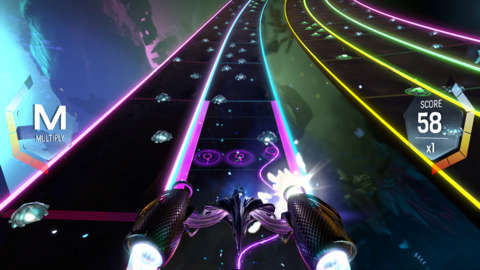Amplitude Brings Rhythm Action Back to its Gaming Roots
Rhythm-based gaming never felt so good.
I never played the original Amplitude for the PlayStation 2.
Back when it launched, it 2003, I was more likely to be playing whichever NCAA Football game I'd found buried in the bargain bin at the local games store. By the time I got around to playing rhythm games, the first wave of Rock Band and Guitar Hero was already well underway.
Because of this, I've only ever played a music game with a plastic instrument. When Harmonix began its Kickstarter to resurrect Amplitude, I backed it knowing next to nothing about it. It looked interesting, and Harmonix had a pretty great lineup of musicians on board to make music for it.
When I finally got the chance to play the new Amplitude, I didn't know what to expect. A three-button rhythm game sounds simple and potentially uninteresting. I didn't really believe that a streamlined, simplified rhythm experience could hold up to a full-scale Rock Band jam session.
Firearms Expert Reacts to Ghost Recon Breakpoint's Guns Xbox Studio Closures Are Confusing | Spot On Gray Zone Warfare | Community Briefing Trailer #1 Senua's Saga: Hellblade II - Senua's Psychosis Feature Trailer Squirrel With A Gun - Official Announcement Gameplay Trailer Night Slashers: Remake || Official Christopher Smith Character Gameplay Trailer 15 MORE Things You STILL Didn't Know In Zelda Tears Of The Kingdom Street Fighter 6 - 8 Minutes of Akuma Gameplay (High-Level CPU) Animal Well GameSpot Review Roblox - Netflix Nextworld Official Trailer Crow Country | Official Launch Trailer Master Detective Archives: RAIN CODE Plus - Official Announcement Trailer
Please enter your date of birth to view this video
By clicking 'enter', you agree to GameSpot's
Terms of Use and Privacy Policy
I was wrong. In fact, I enjoyed playing Amplitude more than I have with any music game since my first moment playing a Rock Band game. It's beautiful, chaotic, and challenging.
The song I played actually comes from the dance-RPG Crypt of the Necrodancer. I found myself nodding my head along with the music, getting into the thumping bass and lilting melodies. My tryst with rock in rhythm games is now over, I'm committing to electronic music. It enraptured me in a way that was completely different from Rock Band. I shut out the world and just let the electronic tune pull me in.
Amplitude benefits from having very few barriers to entry. There is no plastic guitar, no drum pads, or anything else that you've got to learn to use. Instead, all you need is the controller in your hand. The three-button beat-matching works well, testing your dexterity nearly as much as the Rock Band instruments.
Its simplicity also makes this a more personal game. Instead of trying to get a band together and coordinate a song, Amplitude challenges you to master the mechanics and make each song sound as full and well-rounded as possible.

In fact, I was most intrigued by that flexibility to change the song and make it your own. Each song has a backing track carrying a beat and a melody throughout, but when you play, your ship travels along one of several different lanes.
Each of these lanes corresponds to a different part of the song, such as drum fills, vocals, or bass. When you do well, your lane autofills and continues to play that instrument, freeing you up to move to a different instrument of your choice. This creates memorable moments when vocals swell and dominate the song, the bass thumps especially strongly in your ears, or a driving drum section takes over. It doesn't seem like much, but this creativity allows each song to feel a little different every time you play it.
I had no idea how Amplitude would play. I have none of the nostalgia for the original that drove so many Kickstarter donations. In Amplitude, however, I found an enjoyable game that scratched an itch I didn't even know I had. It gave me the sort of personal rhythm experience that I've been longing for, and enough freedom of expression to make me feel like I was a part of making the song.
Got a news tip or want to contact us directly? Email news@gamespot.com
Join the conversation